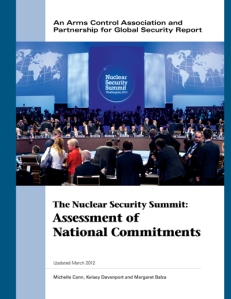 By Kelsey Davenport The Arms Control Association and the Partnership for Global Security released a report today that tracks the progress countries have made toward completion of the national commitments made at the 2010 Nuclear Security Summit. The report concludes that approximately 80 percent of these commitments have been completed. To read the full report, The Nuclear Security Summit: Assessment of National Commitments, click here. While these achievements are laudable and countries should be commended for following through on their pledges of action, it is important to emphasize that much work remains to secure fissile materials and prevent nuclear terrorism. Completing even 100 percent of the national commitments offered at the 2010 Nuclear Security Summit will not meet the goal of securing nuclear materials world-wide. Global nuclear security is a long term process that must grow and adapt to new threats. The national commitments made so far represent only a small fraction of the work that needs to be done. This report is being released in advance of the 2012 Nuclear Security Summit in Seoul, where leaders from 53 countries and four international organizations will meet March 26-27. One of the objectives for the Seoul summit is to assess the progress that has been made since leaders endorsed the goal of securing all nuclear materials at the first summit in April 2010. At the Washington summit, leaders signed on to a consensus work plan and communiqué which focused on achieving these objectives. In addition, 30 countries made 67 specific national commitments designed to enhance the global nuclear security regime. It is these national commitments that are assessed in this report. Examples of completed national commitments include:
By Kelsey Davenport The Arms Control Association and the Partnership for Global Security released a report today that tracks the progress countries have made toward completion of the national commitments made at the 2010 Nuclear Security Summit. The report concludes that approximately 80 percent of these commitments have been completed. To read the full report, The Nuclear Security Summit: Assessment of National Commitments, click here. While these achievements are laudable and countries should be commended for following through on their pledges of action, it is important to emphasize that much work remains to secure fissile materials and prevent nuclear terrorism. Completing even 100 percent of the national commitments offered at the 2010 Nuclear Security Summit will not meet the goal of securing nuclear materials world-wide. Global nuclear security is a long term process that must grow and adapt to new threats. The national commitments made so far represent only a small fraction of the work that needs to be done. This report is being released in advance of the 2012 Nuclear Security Summit in Seoul, where leaders from 53 countries and four international organizations will meet March 26-27. One of the objectives for the Seoul summit is to assess the progress that has been made since leaders endorsed the goal of securing all nuclear materials at the first summit in April 2010. At the Washington summit, leaders signed on to a consensus work plan and communiqué which focused on achieving these objectives. In addition, 30 countries made 67 specific national commitments designed to enhance the global nuclear security regime. It is these national commitments that are assessed in this report. Examples of completed national commitments include:
- Chile eliminated its entire stockpile of highly enriched uranium (HEU).
- Kazakhstan has also taken significant strides by completing the shut down its BN-350 reactor and securing the reactor's fuel – which consisted of more than 10 tons of HEU and three tons of plutonium.
- Russia also halted plutonium production.
- The United States and Russia signed a plutonium-disposition protocol, which will require each country to dispose of 34 metric tons of weapons grade plutonium.
When viewed in aggregate, completed national commitments also demonstrate the important role that nuclear security culture must play in the effort to secure nuclear materials. Many countries recognized the need to improve security culture and made commitments that increased support for activities that develop human capacity and institute best practices: For example, since the 2010 summit, nine countries (Canada, China, France, India, Italy, Japan, Kazakhstan, South Korea, and Saudi Arabia) developed new nuclear security centers of excellence, hosted conferences, or held training activities.
National commitments made at the 2010 Nuclear Security Summit also underscored the need for diverse and reliable funding for nuclear security activities. New funding was committed for the International Atomic Energy Agency and several countries committed to multilateral partnerships that fund activities such as highly enriched uranium removals, reactor conversions, and anti-smuggling initiatives. Eight countries (Belgium, Canada, Japan, New Zealand, Norway, Russia, the United Kingdom and the United States) completed commitments in these areas. At the 2012 Seoul summit, leaders must capitalize on the momentum of the past two years and push countries to make further national commitments that will have a real impact on nuclear material security. With the last summit potentially being held in the Netherlands in 2014, the next two years provide a window of opportunity to make further progress in strengthening the global nuclear security regime.
